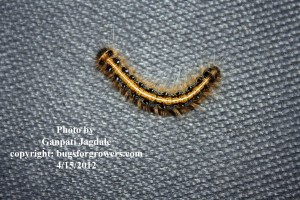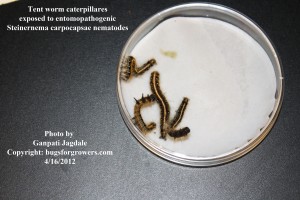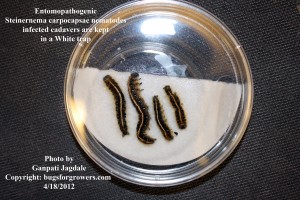Last Monday, I read an article about eastern tent caterpillars on the website of Crossville Chronicle (http://crossville-chronicle.com/features/x1221402699/PLATEAU-GARDENING-Reader-inquires-about-Eastern-tent-caterpillars) and thought that I should share the results of my small experiment that I conducted about an interaction between tent worms and

entomopathogenic nematodes. I hand picked four tent worms, which were crawling on my driveway and tested their susceptibility to an entomopathogenic Steinernema carpocapsae nematodes.
In this experiment, I transferred 400 infective juveniles of Steinernema carpocapsae nematodes (100 juveniles/larva of tent worms) in 1 ml of water on a filter paper placed in a plastic dish (9 cm diameter) and then four tent worm larvae were transferred in the same plastic dish.

These plates were then incubated at room temperature for 48 hours. After 48 hours of incubation, I found that all the four tent worm larvae were dead. This means entomopathogenic Steinernema carpocapsae nematodes infected and killed tent worms within 48 hours of infection.
This showed me that the tent worms were susceptible to Steinernema carpocapsae nematodes. In order to confirm the infection by entomopathogenic nematodes, tent worm cadavers were transferred in a White trap for the emergence infective juveniles of entomopathogenic Steinernema carpocapsae nematodes.

After 12 days, I saw under microscope that the thousands of infective juveniles of Steinernema carpocapsae were emerged from tent worm cadavers in a White trap .
Thus these results suggest that the entomopathogenic nematodes can be used to kill tent caterpillars. However, for better I believe that you have to apply nematodes when tent worms are crawling are on the ground.
